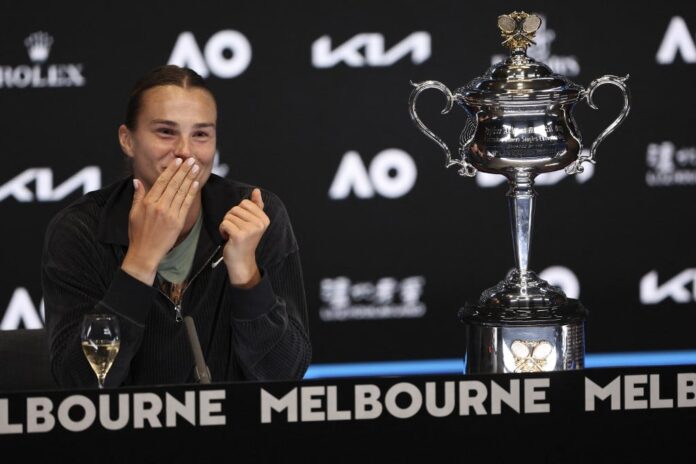ABU DHABI: From seriously struggling with her serve at the start of last year to becoming a Grand Slam champion in Melbourne last month, Aryna Sabalenka’s remarkable journey has earned her praise from across the tennis community.
The 24-year-old Belarusian led the WTA tour in double faults in 2022, with a whopping 428 in 55 matches, but still managed to end the season in the top five.
She started working with biomechanics and performance coach Gavin MacMillan in August 2022 to try and overcome her serving woes and it paid dividends as she has kicked off 2023 with a perfect 11-0 record and two titles — Adelaide and the Australian Open.
Reigning Wimbledon champion Elena Rybakina, who lost to Sabalenka in the Australian Open final, noted the significant progress her opponent has made on her serve and expects her to continue to be a real threat on tour.
Speaking to Arab News at the Mubadala Abu Dhabi Open this week, Rybakina said: “I think she’s a really hard-worker and she did a great job. I remember how much she was struggling with the serve, and now there are still some double faults here and there, but overall the serve was really good, especially in the Australian Open final.
“Her second serve was coming in like the first one. The speed was quite high and I think she worked really hard to get to where she is now. I think now she is at her best and will continue like this for sure.”
World No.8 Daria Kasatkina joked that she can relate to Sabalenka when it comes to serving problems, having experienced her fair share, and described the Belarusian as one of the hardest-working players on tour.
“I don’t know if people outside of tennis see it or not, but we are here and see everything inside, you could clearly see that she’s making 1,000-percent effort to win a slam,” said Kasatkina.
“It’s a very important thing and she has talked about it many times. You could see in the previous slams how important it was to her, and sometimes she was too tight because it was so important. It’s normal — if you want something so badly you get nervous. You could see when she won it was like the (pressure was lifted).
“She completely deserves it. She’s one of the hardest workers on the tour.”
Swiss world No. 9 Belinda Bencic lost to Sabalenka in the fourth round of the Australian Open last month and admitted she felt overpowered by her rival during the match.
Bencic, who faces Beatriz Haddad Maia in the Abu Dhabi semi-finals on Saturday, said she always knew Sabalenka had it in her to win a major.
“For me, it’s not so surprising. I’ve always thought she’s a great player who’s capable of a lot of things and great results. It worked for her in Australian Open,” said Bencic.
“On one side I’m kind of sad I lost in the fourth round, but, on the other side, if you lose against the (eventual champion) it makes you feel a little bit better about yourself and you know that you can go there as well, if you improve a couple of things. She’s definitely showing what I (need to) improve to beat her. It’s definitely great for her, and congrats to her.”
Former world No. 1 Karolina Pliskova is a player who, like Sabalenka, relies on a huge serve and massive groundstrokes. Pliskova has also had her ups and downs in recent years and suggested both she and her coach Sascha Bajin can learn a lot from Sabalenka’s journey.
“Yes, of course (we can get inspiration from that). I did watch her video from her biomechanics manager about the serve on YouTube, so I’m aware of it,” admitted Bajin.
Pliskova believes both Sabalenka and fellow big-server Rybakina can be particularly threatening if they have full belief in their respective games, given the weapons that they possess.
“Obviously she’s dangerous if she’s confident. It’s the same with Rybakina. These girls, if they have confidence, they really have a big game and they can win. I always thought that it was a matter of time before she won a Grand Slam. She was there, quite close. I think she has the game to win big tournaments,” said Pliskova.
Sabalenka’s grit and determination have always shone through, irrespective of her, at times, erratic performances on court. Her father Sergey passed away in November 2019 at the age of 43 and, two months later, she was on court battling through matches in honor of his memory.
“I’m just trying to fight because my dad wanted me to be No.1,” Sabalenka told reporters in Adelaide at the start of the 2020 season. “I’m doing it for him, so that’s what is helping me to be strong right now.”
One player who perhaps knows Sabalenka better than anyone else on the tour is former world No.2 Paula Badosa. The Spaniard initially thought Sabalenka “looked very aggressive and intimidating,” but they soon hit it off, played doubles together and became close friends.
“As she always says, we’re soulmates,” said Badosa. “I think we’re very similar personalities and I admire her a lot. She’s a fighter and she’s been through a lot — tough moments — and she’s always fighting, no matter what.
“We all remember how she started last year in Australia with the serve and she tried and she tried and she never gave up, and she had an amazing reward,” she continued.
“I know for her it was very important and it’s a dream come true. And I was very happy because we’re very close and we’re living, like, the same journey together. I think that she totally deserves it.”
Now No.2 in the world and undefeated so far this season, Sabalenka’s next appearance will come at the Dubai Duty Free Tennis Championships, which begin Feb. 19.

